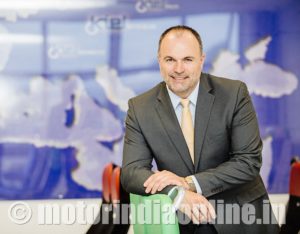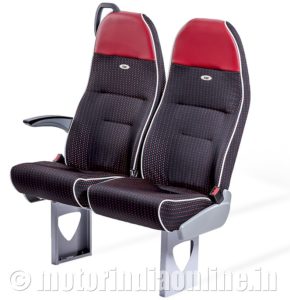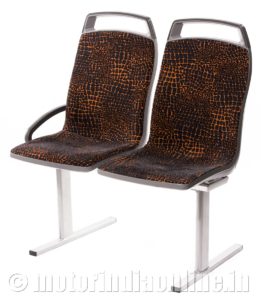Seat maker to participate in Busworld India 2018
Franz Kiel GmbH, one of Europe’s leading manufacturers of seating systems for commercial vehicles and public transportation, including buses and trains, is preparing for an entry into the Indian and Chinese markets. The German seat producer is in advanced stages of bagging an order from one of its customers in the train segment in India which could pave the way for it to set up shop locally in the country, while in China it is in the process of setting up a joint venture.

Headquartered at Nördlingen in Germany, Kiel currently produces close to 500,000 seats a year and clocked a turnover of around Euro 145 million in sales in 2017. The company is targeting sales of over Euro 200 million by 2020 which will position it among the top three seat makers at the global level.
Having started off as a supplier of seating systems to customers in the European region, Kiel’s uncompromising focus on delivering unquestioned German quality and consistency in coming up with highly-innovative seating solutions for customers has helped it evolve into one of the most respected and sought-after seating brands in the world. As of today, the company has manufacturing footprint spread across the globe – in Germany, France (sales organisation), Spain, Poland, the Netherlands, Turkey, the US, Macedonia and Russia (joint venture).
In the last eight years, Kiel has pumped in significant investments to set up production facilities in Spain, North America, Russia and Macedonia, and to further expand its Turkish and Polish facilities. Despite being a leading seat supplier for buses globally, the company is yet to enter the world’s two largest bus markets, namely, China and India. That said, the situation is set to change, very soon.
Says Mr. Josef Vega, Managing Director, Kiel Group: “Internationalization has always been the motto for the Kiel Group which is why we have created five new manufacturing sites around the world during the last ten years. We are in discussion with a partner for a joint venture in China which will be finalized latest by the end of this year, and we are very serious about making an entry into the Indian market. Our first steps for now will be to focus on India and China, following which we will look at expanding to the South American market where we focus to increase our presence.”
Kiel is confident of a significant jump in overall sales if its business strategy for India and China is executed as planned.

Growing interest in Indian market
Talking about the Indian market, Mr. Vega continues: “Until now, the Indian market was not our number one priority. However, our interest and focus on India has increased as we see huge investments being done in the train sector in the country. The developments in India give us a big boost and makes the market very interesting for us.”
While Kiel acknowledges the competitiveness of the Indian market, it hopes to learn from its experiences in Turkey, an equally competitive market. “We are one of around 40 to 50 seat manufacturers in Turkey and have a market share of nearly 20 per cent. So, we have the experience of working in very competitive markets and have what it takes to be successful. We produce close to 300,000 seats a year at our Turkish facility. In India, the market size of the luxury coach segment is around 600 units annually which translates to a total addressable market of around 30,000 seats a year. This is not large enough for us to look at local production, but if we add the market for train seats to this, it makes things a lot more interesting for us”, he shares.
Kiel is looking to use the train segment as an entry door into India and plans to offer solutions to the bus segment as well. The company’s participation in Busworld India 2018 to be held in Bangalore in the last three days of August is a clear indication of its growing interest in the Indian market. Kiel will be exhibiting a train seat at the show to try and evoke interest from any train manufacturer who may visit the fair, though its primary focus would be to communicate its readiness for the Indian bus & coach market.
Delivering value to customers
Once Kiel starts catering to customers in the Indian bus market, it plans to offer the complete range of seats starting from its light-weight city bus seats all the way up to its five-star coach seats which offered unmatched comfort for long-distance travel. While being well aware that pricing would be an obvious challenge, Kiel has no plans of producing cheap seats, but rather look forward to maintaining its globally-successful approach of delivering value to customers.
“If our customer wants us to be at a location, we are there. If there is a project, a customer and a market that wants us, we are of course interested in supporting and following them. Our customers know what they get from us – world-class seats at a defined price level, internationally-proven design and concept, undiscussed quality levels and local support. Whatever products we make across all our facilities are of the same quality level. We will ensure our seats suit the Indian market but will not make any compromise on quality”, he explains.
Mr. Stephan Stieglauer, Director – Sales & Marketing, Kiel Group, adds: “Regarding the cost, we will try to explain to our customers about the total cost of ownership. Our customers know that Kiel does not offer the cheapest product, but when it comes to total cost of ownership they know we are one of the best in the world. Cheap products need to be changed in four to five years, whereas Kiel products last for 15 years or even more.”
Given the potential and maturity of the bus market in south India, Kiel has identified Bangalore as a possible location for its production facility if at all it decides to start manufacturing seats locally. It plans to cater to the other regions through warehouses and an efficient logistics chain that would optimize its products’ time-to-market and ensure timely delivery to customers.

